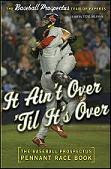In a recent post I mentioned that Bill James advocates allowing hitters to refuse a walk (any walk, not just intentional ones). He reasons that walks were initially instituted not as a defensive weapon to avoid good hitters but rather as an incentive for pitchers to throw strikes. In his words "The reason that should be the rule is because the walk was created to force the pitcher to throw hittable pitches to the batter. That is the walk's natural function. To allow the walk to become something the defense can use to its advantage with no response from the offense is illogical and counterproductive". He then advocates that on the 2nd walk of the at bat the batter advances to second base and all runners advance two bases. As you might imagine this topic has drawn some discussion on the SABR list server as well.
Although I agree with the history tied to his argument, current utility differing from original intent is not a strong enough argument in and of itself to make such a radical change. The fact is that teams and players attempt to use the rules in the most strategically advantageous way given the current context. This is why the value of the stolen base fluctuates with the run environment of the league or era in which it is used. And of course an argument from original intent doesn't hold water when you consider that originally a pitcher was not to use deception at all but instead to serve pitches as requested by the hitters.
So the argument for allowing the refusal of walks has to have a basis elsewhere. Some of these might be:
Are there others? On the first point I doubt that it would have any effect. The defensive team still has to get 27 outs and so the refusal of the walk simply gives the next at bat to the same hitter. A second walk would certainly increase the chances of scoring but that wouldn't have an effect on the length of the game. Besides there are lots of more sensible ways to speed up the game including not throwing out every ball that touches the ground, limiting trips to the mound, and refusing timeouts for the batter between pitches. I can't disagree with the second point since the fans generally pay to see the best hitters perform, and so this to me is the best argument for such a rule. I assume a side effect would be that in blowouts hitters would refuse walks more often in order to get a chance to pad their hitting stats.
On a couple of other notes, I ordered MLB Extra Innings from Time Warner cable this season and am loving it. I watched the 9-1 Cubs victory last night over the Pirates last night broadcast by the Pirates network. Although both the Cubs and Royals televise lots of games here in KC via WGN and the Royals Sports Television Network (RSTN), four of the six games this week were not going to be on WGN and its fun watching the broadcasts from other teams. I caught a bit of the Giants/Padres game last night as well.
Also just received my copy of the The Baseball Encyclopedia. This is the third copy in various forms I've owned. The first being one published around 1981 and the second, Total Baseball, published in 1990. What I like about this one is that it is softcover and cost only $24.95. It also now includes intentional walks and HBP, run support, blown saves, and fielding range. From the sabermetric perspective it includes AOPS (adjusted OPS for league and park normalized to an average or replacement player), ABR (batting runs based on linear weights adjusted for league and park and normalized to what an average or replacement player would have done), BFW (batter, fielder, base stealer wins, the number of wins a player contributed in all facets of the game), FR (Fielding Runs, the number of runs a defensive player saves his team), AERA (adjusted ERA normalized for the context and converted to a scale of 100 as average), APR (adjusted pitcher runs or how many runs a pitcher allowed to score compared to an average pitcher), and PW (pitcher wins, a measure of how many wins a pitcher contributed based on his pitching, hitting, and defense).

125x125_10off+copy.jpg)



No comments:
Post a Comment